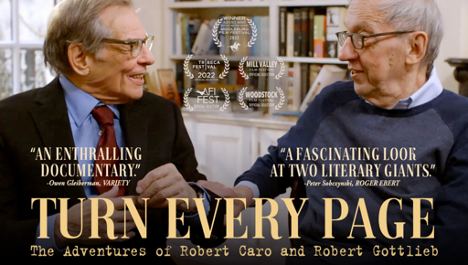I’ve never had a literary agent or an editor, but I developed a deep appreciation for the skill set after hearing Mary Norris, copy editor at the New Yorker, read from her book Between You and Me: Confessions of a Comma Queen several years ago. But there’s a film playing in theaters now that has expanded that appreciation exponentially.
Turn Every Page is a documentary that chronicles the fifty-year relationship of Robert Gottlieb, the editor-in-chief at Alfred A. Knopf Inc. and Pulitzer Prize-winning author Robert Caro. The film is the result of a seven year-long project by Lizzie Gottlieb, Robert’s daughter and an accomplished film maker in her own right.
It might be hard to imagine how a film about an editor and writer could be a thriller…but it is. Caro is 86, Gottlieb 91, and their drama revolves around the much-anticipated completion and publication of the last volume (Volume 5) of Caro’s biography of Lyndon Baines Johnson. This concluding volume details his presidency during the Vietnam War years. The first four volumes run to more than 3,000 pages.
Much of the film centers on the book that brought the two together, The Power Broker, Caro’s biography of Robert Moses, who was without question the most influential urban planner and developer in American history–the man responsible for planning and building more than 627 miles of freeways and connecting roads around New York City without ever holding elective office.
The Power Broker won the Pulitzer Prize for biography in 1974. In its final form the book came in at 1336 pages. Gottlieb cut more than 350,000 words (700 pages) from the manuscript to reach the final count, and they argued about every semicolon. Fifty years later they still do.
Editing Caro is no easy task, but Gottlieb is no lightweight. His stable of authors has included Toni Morrison, John LeCarre, Doris Lessing, Michael Crichton, Nora Ephron and Mordecai Richter. And, as Joseph Heller’s editor, the one responsible for changing the name of Heller’s novel from Catch-18 to Catch-22. But that’s another story.
Before my encounter with the “comma queen,” I developed an appreciation for editors when Kit Duane, an old friend, asked me to read a Vietnam war novel she was editing. It was 2005 and thirty-years after the end of that terrible war. I told her I didn’t think the world needed another Vietnam war novel, but she asked me to read it anyway. It was about a Marine platoon leader. She thought it was remarkable and wanted my opinion as a former Marine and Vietnam era vet.
I was wrong. She was right, and the book, Matterhorn, debuted on the New York Times bestseller list and remained there for 16 weeks in 2010. So much for my literary vision.
If you have even a passing interest in writers and the role of their editors, Turn Every Page is a master class in editing relationships and should not be missed.

Gottlieb, who earlier in his career served as Editor-in-Chief at Simon and Schuster and The New Yorker, says he views the editor’s job as helping the writer deliver his vision, not changing the work. His aim is to add clarity to the writer’s intention.
Along the way, the filmmaker brings in New Yorker editor David Remnick, novelist Colm Toibin, late night host Conan O’Brien, and actor Ethan Hawke to add content and appreciation for both writer and editor.
One of the more interesting exchanges between these two involves an extended discussion on the use of the semicolon – during page markups. Both are adamant about the purpose of that particular punctuation, and when the discussion got overheated Caro had to leave the room to avoid an intemperate outburst. Hearing that reminded me of Kurt Vonnegut’s strong views on the same subject: “Here is a lesson in creative writing. First rule: Do not use semicolons. They are transvestite hermaphrodites representing absolutely nothing. All they do is show you went to college.”
Vonnegut’s opinion was not given air in the film, but other literary opinions were expressed. Colm Toibin praised Gottlieb and Caro for their attention to the rhythm of the prose, something more often alluded to in fiction rather than non-fiction. And Mary Norris made a cameo appearance with a remark about commas.
The most agreed upon opinion, however, is that the first requirement for an editor is to be a good reader and childhood photos of both Caro and Gottlieb reading as very young children are included to make the point. If you are reader, you will be richly rewarded by seeing these two in action. It’s in theaters now but should be streaming soon.

































Every writer needs an editor. The proof is if you have ever read an unedited autobiography of a friend.
Jack,
Thanks for this. I heard the promos for the film and have been interested in Caro’s work ever since I read The Power Broker in the 70’s. Caro’s (somewhat) recent piece in the New Yorker from the LBJ work about the day Kennedy was assassinated should be required reading in U.S. history classes.
I’m looking forward to seeing the film when it streams!
I loved every moment of this film

